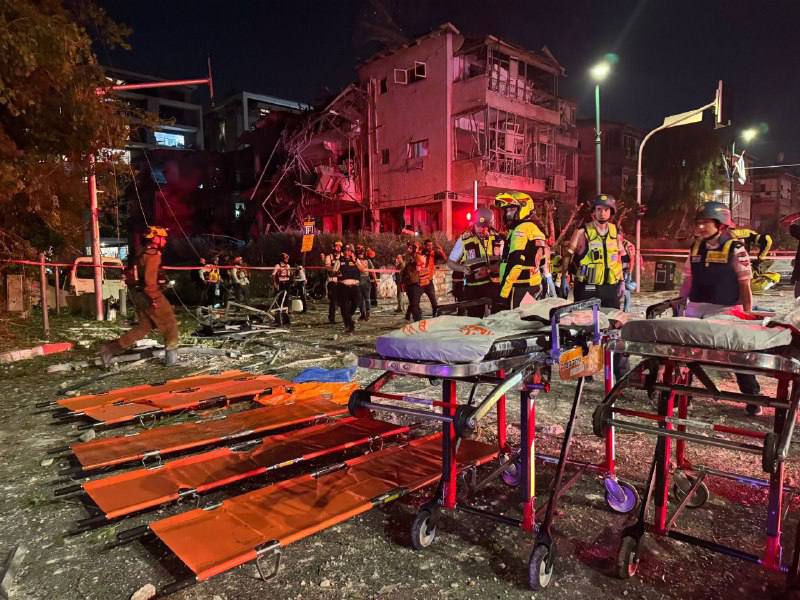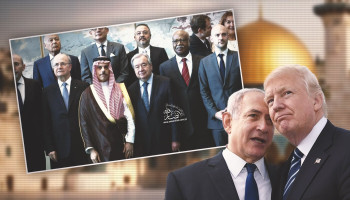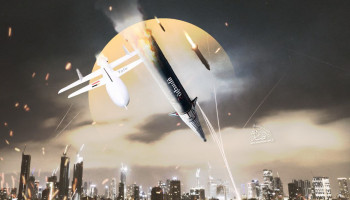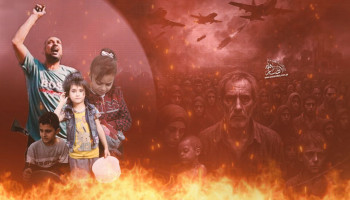In the early hours of Dhul-Hijjah 17, corresponding to June 13, the Zionist entity committed a criminal act of aggression, launching a treacherous and surprise attack on the Islamic Republic of Iran. The initial wave of these hostile airstrikes resulted in the martyrdom of several senior military commanders, nuclear scientists, and dozens of civilians, including women and children. Hours later, Iran responded with six rounds of ballistic missiles and several drones that penetrated Zionist air defenses, striking the Kirya military headquarters, the so-called "Ministry of Security," and several buildings in occupied Yaffa (Tel Aviv). One of the most significant outcomes of Iran’s multi-wave attack—aside from the extensive material damage to military sites and Zionist buildings—was that millions of Zionists were forced to remain in shelters, gripped by fear throughout the night.
مشاهد لسقوط عشرات الصواريخ في وسط فلسطين المحتلة بعد أن فشل الاحتلال باعتراضها. pic.twitter.com/BcWG6rr2PQ— صدى الأحداث (@1alahdath) June 13, 2025
Premonitions of Aggression
Although the Israeli assault was shocking in its exact timing—down to the day, hour, and minute—it was not entirely unexpected. Several signs pointed to a looming attack on Iran. Chief among these was the Zionist Knesset’s failure to dissolve Netanyahu's “government.” According to the regime’s public broadcaster, close associates of Netanyahu told the Haredi parties, “We are going through a sensitive security phase, and developments may occur soon.” Netanyahu's circle emphasized the necessity of maintaining “government” stability during this period.
A second indication came with Washington’s decision to reduce its diplomatic footprint in Iraq based on recent intelligence assessments. The Associated Press reported that U.S. officials revealed plans by the State Department to evacuate all non-essential personnel and family members from American embassies in Baghdad, Bahrain, and Kuwait. A U.S. defense official confirmed that CENTCOM was monitoring escalating tensions in the Middle East and stated that Defense Secretary Pete Hegseth had approved the voluntary departure of military families from bases in the CENTCOM region.
Meanwhile, prior Zionist threats of strikes on nuclear facilities added to the rising tensions. According to Axios, two Zionist sources recently confirmed that “Israel” was preparing for a swift strike on Iran’s nuclear sites should negotiations between Tehran and Washington collapse and that the window for a successful strike on Iran's facilities was narrowing. The Zionist forces had reportedly begun maneuvers and preparations for such an operation, and the U.S. military was fully aware. One source said Netanyahu held a “highly sensitive” meeting with ministers and top intelligence and security officials to evaluate the nuclear talks’ trajectory.
On the eve of the assault, a third sign emerged. The IAEA Board of Governors issued a resolution on Thursday accusing Iran of failing to meet its nuclear safeguard obligations. This gave political cover for the current aggression against Iran and its nuclear infrastructure.
Despite these indicators, it was widely believed that any attack would follow the upcoming negotiation round scheduled for Sunday in Muscat, Oman—especially considering Iran’s insistence on continuing enrichment inside its borders and refusing to forfeit that right, which Washington interpreted as a deal-breaker. While Trump had repeatedly deemed this stance unacceptable.
Iranian Response: Absorbing the Blow and Taking the Initiative
Iran’s reaction matched the magnitude of the assault and its targeting of leadership hubs. The first step was promptly filling leadership voids. Imam Khamenei issued appointments in the IRGC command, the general staff, the Aerospace Force, and other key sectors. In a televised address on Friday evening, the Leader of the Revolution stated:
“The Iranian people will not remain silent about the blood of their noble martyrs, nor will they tolerate the violation of their skies. Our armed forces are on full alert, backed by the officials of the state and the entire nation.”
After offering condolences to the Iranian people and prayers for the fallen leaders, Imam Khamenei referenced messages from various political factions and national figures. “Everyone feels the need for a firm stand against the evil and terrorist nature of the Zionist entity,” he affirmed, adding, “We must act firmly—and by Allah's will, we will act firmly. There will be no leniency.”
He stressed unequivocally:
“Life will become bitter for them (the Zionists), without a doubt. They should not imagine that they’ve struck and it’s over. No. They are the ones who started it, who ignited the war. We will not let them walk away unpunished from this great crime.”
Khamenei reiterated that “the armed forces of the Islamic Republic will deliver severe blows to this evil enemy,” stating, “The people support us—they support the armed forces,” and emphasizing, “The Islamic Republic will triumph over the Zionist entity, by Allah's will.”
He urged “ the dear people” to “know this and be confident that there will be no negligence in this matter.”
Meanwhile, Iranian President Dr. Masoud Pezeshkian issued a warning through the presidential website, vowing that “Israel” would receive a strong response that would make it “regret” its dawn attack on Iran.
These positions were echoed unanimously across Iran’s institutional leadership—legislative, political, and governmental—demonstrating national unity.
Iranian Unity
Ironically, the Israeli aggression inadvertently unified the Iranian public behind their leadership, reinforcing the necessity of responding to the Zionist regime and its heinous crime. Millions of Iranians took to the streets after Friday prayers, reaffirming Iran’s right to decisively retaliate. Messages, statements, and declarations from political parties, institutions, and public figures underscored the need for firm action against the criminal entity.
As Iran’s air defenses responded to the attack, large crowds in Tehran cheered on the military’s success in intercepting hostile targets, a show of national solidarity that undermined one of the Zionist regime’s key objectives. Netanyahu had explicitly appealed to the Iranian people to turn against their own leadership.
The Fate of Negotiations with Washington
The sixth round of negotiations was seen as pivotal, especially given the increasingly rigid stances from both Washington and Tehran. Oman had announced that talks would begin Sunday in Muscat. However, the Zionist strike has cast a heavy shadow over this round and will likely derail or cancel it entirely.
It was surprising, even naïve, that Trump made statements about the upcoming talks as though Iran would still attend, even as its nuclear infrastructure suffered under a U.S.-backed Israeli assault. Naturally, Tehran cannot be expected to negotiate with Washington under the pressure of war and aggression. It is unreasonable for the U.S. to expect Iran’s participation while it arms the Zionist entity with the tools and support to carry out such a large-scale attack.
Accordingly, Iranian state television announced that Iran would not take part in the indirect nuclear negotiations with the United States in Oman on Sunday. Later on Saturday, Iranian Foreign Ministry spokesman Esmail Baghaei said in comments published by IRNA that “a final decision on the matter has not yet been made.” He stressed that Iran “cannot believe the Zionist entity embarked on this military adventure without coordination or an American green light.” He held the U.S. administration responsible for “the reckless and illegal actions of the Zionist entity,” adding, “Our decision regarding participation in Sunday’s negotiations remains undecided.”
A Nuclear Response to Aggression?
The Zionist aggression on Iran’s nuclear facilities was not merely a military operation—it was an attempt to shift the rules of engagement and forcibly impose the Zionist regime’s will on the future of Iran’s nuclear program. Yet this treacherous attack, marked by destruction and the targeting of scientists and civilians, may push Iran toward a strategic pivot: from peaceful enrichment to acquiring nuclear deterrent capability.
For decades, Iran adhered to peaceful nuclear principles, despite sanctions, assassinations, and threats. But the direct targeting of Iran’s scientific and nuclear core—and “Israel’s” blatant crossing of red lines—may now redefine the deterrence equation. Messages written with missiles may, if necessary, be answered in the language of the nuclear option, particularly if Iran sees it as the only viable path to protect its sovereignty and regional standing.
More than two months ago, senior adviser to the Supreme Leader, Ali Larijani, warned that while Iran does not seek nuclear weapons, an attack might leave it with no choice. “If you choose to bomb us—whether directly or through Israel—you will force Iran into a different decision,” he said, speaking to the United States.
It is now clear that the Israeli attack may open the door to a new phase in Iran’s strategic and nuclear doctrine, especially if the West continues its collusion and refuses to acknowledge Iran’s right to defend its national security through any necessary means. In geopolitics, the bomb is not always more dangerous than the doctrine of “impunity.” And if Iran finds itself forced to develop a nuclear weapon, it will be as an act of necessity—not premeditated aggression.
Conclusion
The Zionist strike may not have been sudden in its intent, but it was in its timing. In that, it miscalculated—and ignored a fundamental truth: Iran is not taken by surprise, and the blood of its leaders does not flow in vain. The enemy committed a major crime, thinking it could escape unscathed. But the response came thundering from the depths of Iranian soil, through shattering missiles and drones forged by Iranian will, shaking “Tel Aviv,” paralyzing its settlements, and turning its night into a day of terror echoed in the underground shelters where the murderers of children hide.
Today, with the Iranian people united behind their leadership and the armed forces fully prepared, the conflict has entered a new phase. The Zionist entity no longer controls the timing or shape of war. The message has been delivered, and the enemy has understood its meaning:
Those who ignite the fire in Tehran… will sleep beneath it in "Tel Aviv".







